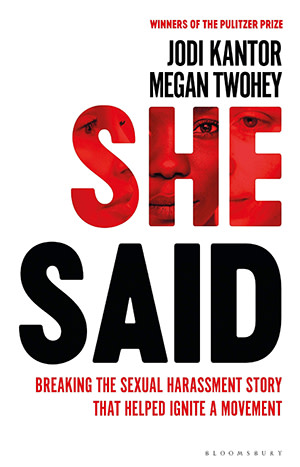She Said — a moving account of how the Weinstein story broke
Roula Khalaf, Editor of the FT, selects her favourite stories in this weekly newsletter.
Almost exactly two years ago, I bumped into Harvey Weinstein and his student-age daughter at a conference in Aspen. I barely knew the movie mogul, but Weinstein was keen to chat — and I liked his daughter enormously.
So we huddled in a bar and ordered Weinstein a burger. Then, after an hour of seeming jollity, Weinstein suddenly dismissed the food order and exploded at the waiter in extreme rage — prompting me to depart in horror (as his poor daughter looked stricken). “What the heck just happened?” I wondered.
Now the answer is clear: as a new book recounts — She Said — in the week that I met Weinstein, he knew that his world was about to crumble and was fighting to prevent that. On October 5 2017, two New York Times reporters — Jodi Kantor and Megan Twohey — wrote a story that painstakingly recounted allegations from a string of women that they had suffered sexual abuse by Weinstein while he was running the movie company that carried his name. (He maintains any sexual contact was consensual, and the next criminal court hearing takes place next year.)
Before these revelations emerged, Weinstein went to extraordinary lengths to intimidate people to keep the saga secret, displaying the volatile and abusive rage that I witnessed — and which was a hallmark of his career.

Unsurprisingly, She Said has created intense media buzz in America, since it not only covers Weinstein’s downfall, but features Hollywood celebrities such as Gwyneth Paltrow, Ashley Judd, Brad Pitt and Rose McGowan. And since Kantor and Twohey’s account was one factor that sparked the #MeToo movement, the book has unleashed fresh debate about gender politics, and the list of powerful men who have lost power in the past two years due to this social media uprising. “After we broke the story,” the authors write, “we watched with astonishment as a dam wall broke.”
This soul-searching is likely to get even more emotive in the weeks ahead since She Said reveals that some well-known feminist celebrity lawyers — such as Lisa Bloom — have at times protected clients, including Weinstein, from their accusers, while also helping other women advance claims against other men.
Yet if you read She Said seeking a full account of the sordid Weinstein tale, you will be disappointed. The book focuses more narrowly on how the authors broke the abuse tale and handled the victims. It is an account of investigative journalism — or the story behind the story — as much as gender politics, or a corporate exposé.
Irrespective of this, it is often moving. At the end of the book there is a particularly powerful chapter where the authors assemble the female victims in one place, for the first time, to reflect on what they learnt. They do so recognising that the #MeToo movement remains mired in complexity: some observers think that too many guilty men have escaped justice; others fear that the campaign has judged people without due process. “The old rules on sex and power had been partly swept away, but it was not clear what the new ones would or should be,” they write.
The story also reveals the difficult, sometimes dispiriting, nature of investigative journalism and highlights the difficult moral choices produced by investigations. Should journalists put pressure on an abused woman to speak out in the public interest, say? And the book demonstrates the pernicious use of non-disclosure agreements to silence victims. “The US [has] had a system for muting sexual harassment claims, which often enabled the harassers instead of stopping them,” they note.
The book has one weakness: it underplays the degree to which America’s legal system prevented the Weinstein company board from acting earlier to stop his abuse. Notably, some board members wanted to remove Weinstein at an early stage — reportedly suffering threats from him as a result — but it was difficult to kick Weinstein out of the company that carried his name (and he largely owned) before the NYT revelations broke, due to legal restrictions.
This point about corporate governance might not excite much passion among the wider public, and nor does it seem to interest the authors; their coverage of Weinstein’s corporate structure feels sloppy and incomplete. But it matters. A crucial lesson from this saga is that public and private company boards need mechanisms to remove powerful executives who spin out of control — even, or especially, if they own a large part of the company, are protected by powerful lawyers and willing to use dirty tricks against directors (as Weinstein allegedly did).
Thankfully, many companies, and business schools, are now debating these issues. Better still, the #MeToo movement has empowered a generation of women to fight back against abuse, to change the climate of gender politics.
The wider challenge is to maintain this momentum in a fair and balanced way, at companies and other institutions. She Said helps to start this process; but there is still much further to go.
She Said: Breaking the Sexual Harassment Story That Helped Ignite a Movement, by Jodi Kantor and Megan Twohey, Penguin, RRP$28/Bloomsbury, RRP£20, 320 pages
Join our online book group on Facebook at FTBooksCafe. Listen and subscribe to Culture Call, a transatlantic conversation from the FT, at ft.com/culture-call or on Apple Podcasts
Comments